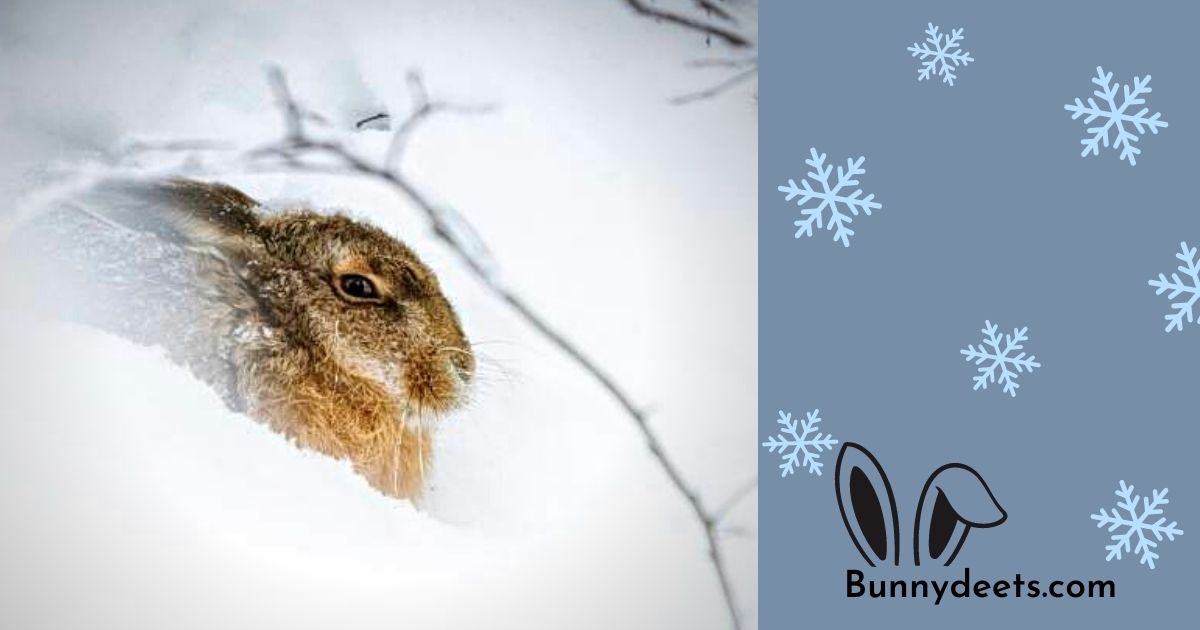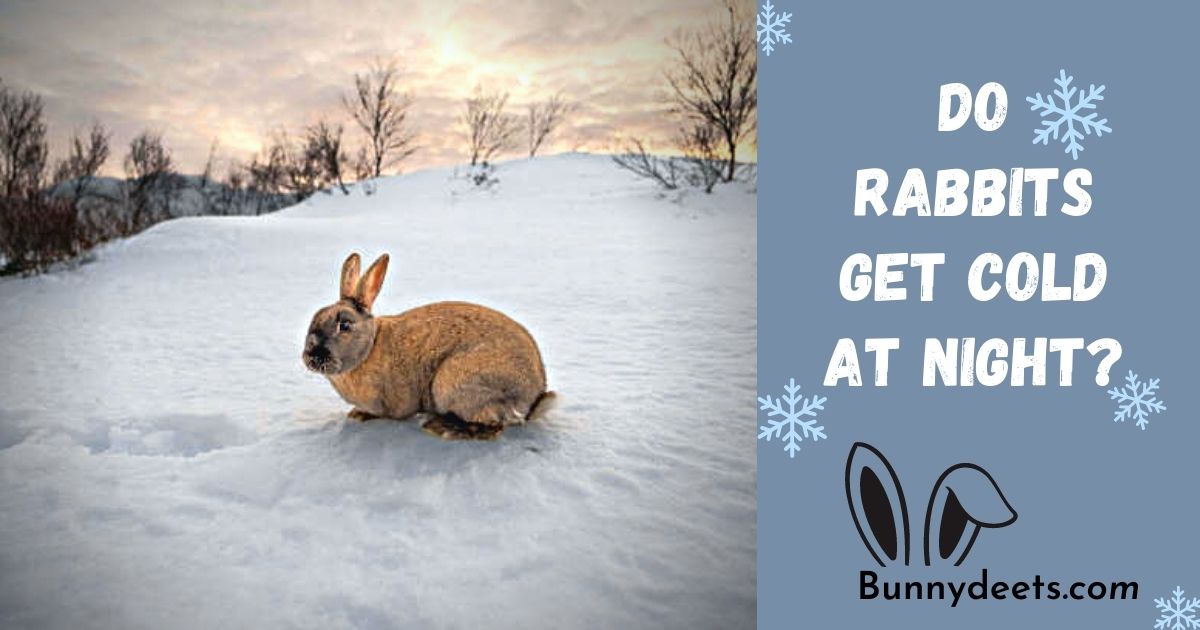It is natural for pet rabbit owners to wonder about the cold weather and its impact on their furry companions, particularly during nighttime. Understanding the temperature conditions that affect rabbits can be a bit complex as it depends on how one defines “cold” and “night.”
Rabbits indeed feel cold during nighttime, but the degree to which they are affected depends on the environmental temperature. Despite their thick fur coats, which provide some insulation, rabbits require additional measures to stay warm. They are most comfortable in temperatures ranging from 45°F to 77°F, which is similar to their natural habitat.
In this article, I will provide comprehensive information on how rabbits cope with cold nights in the wild, along with suggestions on how to ensure your pet rabbits stay warm and cozy during nighttime.
Do Rabbits Get Cold At Night?
Rabbits are generally well-adapted to colder temperatures, as they have a thick fur coat that helps to insulate them. However, they can still feel the effects of cold weather, especially during the night when temperatures drop. In the wild, rabbits often seek shelter in burrows or other protected areas to stay warm.
If you have a pet rabbit and it lives outdoors, it is important to ensure that it has appropriate shelter and bedding to keep it warm during cold nights. The enclosure should be insulated and protected from drafts, and you can provide additional bedding material, such as straw or hay, for the rabbit to burrow into and stay warm.
It is worth noting that some rabbit breeds are more tolerant of cold weather than others. For example, breeds that have been developed in colder climates, like Alaska or Siberian, may have better natural insulation and be more resistant to cold temperatures. However, even these breeds will appreciate a cozy shelter and extra bedding during chilly nights.
What Temperature Is Too Cold For Rabbits?
Any environmental temperature that falls below 40°F is considered too cold for rabbits and they will require extra precautions to help keep them at a regular temperature.
When the temperature falls below this point, rabbits may struggle to regulate their body temperature effectively. They can experience issues such as hypothermia, frostbite, and respiratory problems.
Rabbits are quite delicate creatures, so you will need to ensure that they stay healthy in severe weather conditions. Although It is natural for rabbits to live in a climate zone with low temperatures, it isn’t entirely safe and healthy for them.
This is because unlike other animals living in low-temperature regions, rabbits have softer and shorter fur that isn’t built for freezing temperatures.
Young, older rabbits, sick rabbits, and rabbits with thin fur or less insulation are more vulnerable to the cold and may require additional protection.
Can Rabbits Die From Cold?


Rabbits are very similar to humans as we have similar organs and they also require the same care. It is not enough to just provide them with food and water. They also need a place where they can stay warm during winter.
Rabbits can die from the cold, but it rarely happens. Rabbits are not built for extreme cold weather, because they have short fur and a heavy body. But there are some ways to help them survive in cold weather.
It is necessary to provide your bunny with a heated bed, a snuggly pile of hay or straw, or even an old sweater to keep it warm and cozy during cold weather.
You can also add extra insulation in the rabbits’ homes to keep out the cold air. If possible, take your rabbit outside every day for this 10-15 minutes of exercise so that it does not become overweight and lethargic.
Temperature For Rabbits Outside
The best temperature for rabbits kept outdoors can vary depending on the breed, age, and overall health of the rabbits, as well as the climate and weather conditions in your specific location. However, rabbits are most comfortable in temperatures ranging from 45°F to 77°F (7°C to 25°C).
Extreme temperatures, whether hot or cold, can be harmful to rabbits. In cold weather, rabbits may experience difficulties regulating their body temperature, which can lead to health issues. Similarly, excessive heat can cause heat stress and heatstroke in rabbits.
If you plan to keep rabbits outdoors, it’s crucial to provide them with appropriate shelter and environmental modifications to help them cope with temperature fluctuations. The enclosure should have insulation, be protected from drafts, and offer areas where the rabbits can burrow and find warmth. Additionally, providing bedding material like straw or hay can help them stay cozy.
During periods of extreme weather conditions, such as severe cold or heat waves, it may be necessary to bring your rabbits indoors or provide additional measures to ensure their comfort and safety.
How To Keep A Rabbit Warm At Night?
Bunnies deal with cold much better than heat as too much heat can be deadly to them. If an environmental temperature is ok for you, then it is not too cold for your bunny. Also, opening the window is safe as long as it is not a drastic temperature.
- Make sure that your rabbit’s nest is deep and piled with hay for them to snuggle into.
- A heated pet bed can also be used to provide your rabbit with warmth at night.
- A rabbit’s most important defense against cold weather is getting a fur coat. Rabbits can grow a winter coat of thicker fur, called “a blanket” over the summer.
- If your rabbit lives outside in the wintertime, give them extra hay for insulation at night.
- Provide a kitty bed for warmth or a blanket to burrow into.
- Adopt a companion. They will happily cuddle and keep each other warm overnight.
- If your rabbit is not acclimated, you should give them a small heat lamp for an hour or two each day before switching it off. You should not put them in the direct light of a heating lamp though as this can make them too hot which will result in them not being able to control their body temperature and can lead to death.
Should I Cover My Rabbit Cage At Night?
Whether or not to cover a rabbit’s cage at night is a matter of personal preference and depends on the specific needs of your rabbit. Some rabbit owners choose to cover their rabbits’ cages at night to create a cozy and dark sleeping environment that mimics the natural burrows where rabbits sleep in the wild.
A cover can also provide extra insulation and protection from drafts. However, it’s important to ensure that the cover is not blocking airflow or trapping moisture, as this can lead to respiratory issues or mold growth.
Additionally, some rabbits may feel anxious or claustrophobic when covered, so it’s important to monitor your rabbit’s behavior and remove the cover if they seem uncomfortable.
If you do decide to cover your rabbit’s cage, choose a breathable material such as a lightweight blanket or sheet, and be sure to leave space for ventilation.
Alternatively, you can provide your rabbit with a covered sleeping area within their cage, such as a hut or enclosed bed, to give them a cozy, dark space to sleep.
How Do Rabbits Stay Warm When It Is Cold Outside
Rabbits, even domestic ones, are pretty good at digging. They’ll find an abandoned groundhog den and dig to take up residence there. If it’s not big enough for them, they will dig out further.
Also, if there is a sawmill nearby, they will dig underneath piles of abandoned wood and shelter there, or if there are abandoned cars nearby they’ll dig under them and set up houses there. In the past, you could take an old car hood, leave it in a field, and the rabbits might even raise their babies there.
Rabbits are quite good at finding shelter, especially where we humans would think there is none. They also keep each other warm by nestling together or gathering piles of hay to help keep them warm.
How To Know If A Rabbit Is Cold?
To determine if your rabbit is cold, it’s important first to understand what a “normal” body temperature for a rabbit should be. They will appear cold if their body temperature falls below 100°. If a rabbit has an elevated heart rate and their ears are limp, it may be cold as well.
The first step in figuring out if your bunny is cold is to check its ears. If the ears are flat against their head, then this could be a sign that the bunny is cold.
The next step would be to check the rabbit’s nose and whiskers for signs of frostbite. For example, the rabbit might have a pink or red nose and whiskers.
If your rabbit does not appear to have frostbite but its ears are flat against its head, it could mean that they just need time to warm up before you can tell if they’re cold or not.
Signs That Your Rabbit Is Cold
- Shivering
- Labored breathing
- Tucked head and ears
- Sneezing or coughing (indicates a respiratory infection.
How To Keep Baby Rabbits Warm At Night?
It’s important to keep baby rabbits warm at night, especially if they are newborns or very young. Here are some tips for keeping baby rabbits warm:
1. Provide a heat source
Baby rabbits need a heat source to keep them warm. You can use a heating pad, hot water bottle, or heat lamp to provide warmth. Make sure the heat source is not too hot and that the baby rabbits have space to move away from it if they get too warm.
2. Use bedding
A soft and warm bedding material such as hay, straw, or fleece can help insulate baby rabbits and keep them warm. Make sure to change the bedding frequently to prevent moisture buildup.
3. Keep them together
Baby rabbits can huddle together to share warmth. If you have multiple baby rabbits, keep them together in a small enclosure to help them stay warm.
4. Keep them indoors
If possible, keep baby rabbits indoors in a warm room. This will help protect them from drafts and keep them at a comfortable temperature.
5. Monitor their temperature
Check the baby rabbits’ temperature regularly using a thermometer. A healthy rabbit should have a body temperature between 101°F and 104°F (38°C to 40°C).
Conclusion
Rabbits do well in cool temperatures given that they have the proper adjustment period to grow a nice fur coat.
However, there is only a restricted level of cold rabbits can withstand. So, it is always best to keep your pet as warm and cozy as possible to stay healthy and happy.
You should be mindful of your rabbit’s body temperature when they are outdoors so that they don’t accidentally end up having fatal health problems. You bring them to stay with you inside if the cold becomes too extreme.

